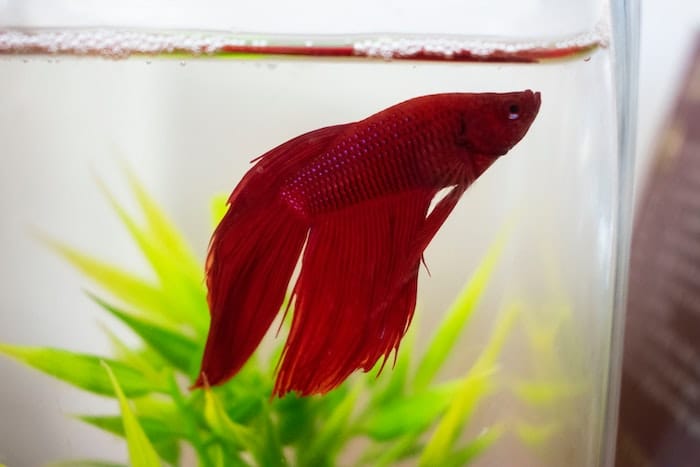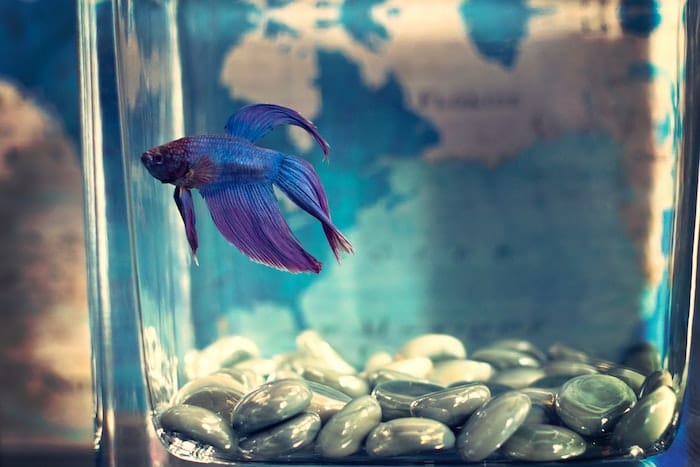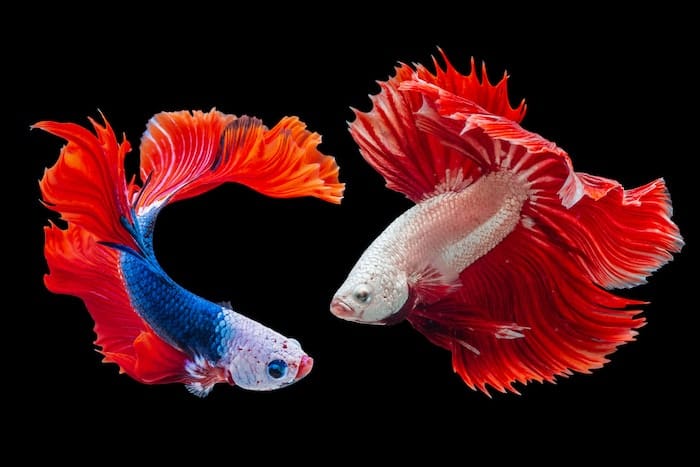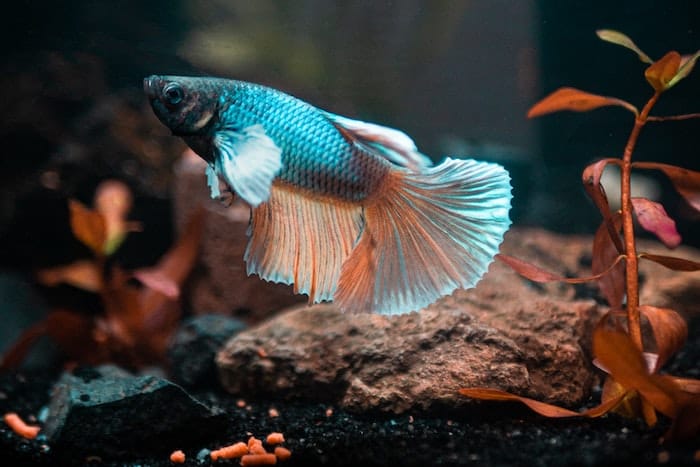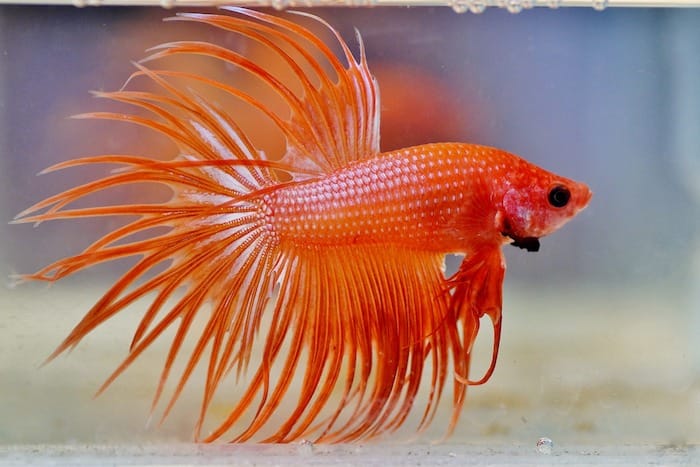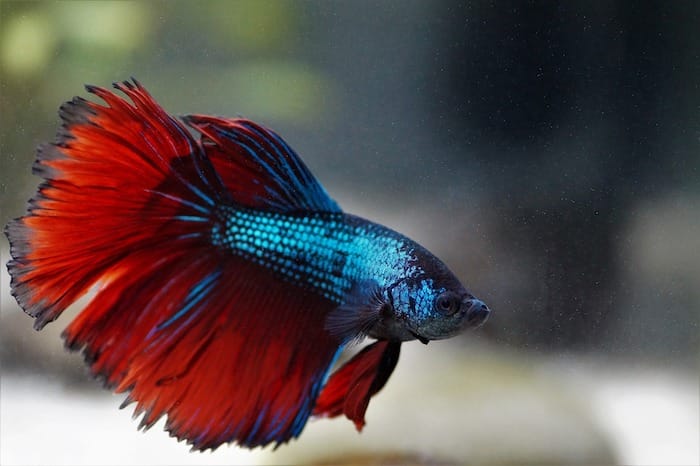Betta fish, also known as Siamese fighting fish, are members of the Betta species and are known for their aggressive behavior. In the wild, they are naturally territorial and will defend their territory against other fish. This behavior has led to the reputation of betta fish as “fighting fish.”
Can You Add Two Betta Fish Into One Tank?
In an aquarium setting, it’s generally not recommended to keep two or more male betta fish together, as they are likely to become aggressive and fight with each other. Female betta fish can be kept together in a group, but it’s still important to provide plenty of swimming space and to monitor them closely for signs of aggression.
Additional reasons not to keep multiple betta fish in the same tank include:
- Betta fish need plenty of swimming space and a well-oxygenated environment. Keeping multiple betta fish in a small tank can lead to overstocking, which can result in poor water quality and harm the health of the fish.
- In a small tank, the accumulation of waste produced by multiple betta fish can lead to poor water quality, which can harm the health of the fish.
- If multiple betta fish are housed in the same tank, they may compete for food, which can lead to stress and injury.
Taking Care of Betta Fish
Here are some general guidelines for caring for a betta fish:
- Tank Size: A betta fish should be kept in a tank that is at least 2.5 gallons, although 5 gallons or larger is recommended for optimal living conditions.
- Water Quality: The water in your betta fish tank should be kept clean and well-filtered. Perform partial water changes of 25-50% once a week to maintain good water quality.
- Temperature: The water temperature should be kept between 76-82°F.
- pH: The pH level of the water should be between 7.0 and 7.5.
- Lighting: Provide your betta fish with a low-light environment. Avoid direct sunlight and bright lights.
- Decorations: You can decorate the tank with live or artificial plants, but be sure to leave plenty of open swimming space for your fish.
- Diet: Betta fish are omnivores and eat both plants and small insects. You can feed them a varied diet of dried or live food, such as brine shrimp, bloodworms, or daphnia. Feed your betta fish two to three small meals per day, but be careful not to overfeed them.
- Compatibility: Betta fish are generally solitary creatures and do not do well with other fish in the same tank. It is best to keep one betta fish per tank.
Betta Fish Tank Size
The size of the tank that a betta fish needs is an important factor to consider for their health and well-being. Here are some additional details about tank size requirements for betta fish:
- The minimum tank size for a single betta fish is 2.5 gallons, but this is considered the absolute minimum. A tank of this size will limit the water quality and can stress your fish.
- A tank of 5 gallons or more is recommended for optimal living conditions for a single betta fish. This provides enough space for the fish to swim and maintain good water quality.
- The shape of the tank is also important for betta fish. A tall and narrow tank is not ideal because it does not provide enough surface area for oxygen exchange. A rounded or rectangular tank with a wider base is better.
- It’s important to use a good quality filter in a betta fish tank. The filter should be appropriate for the size of the tank and should provide enough water circulation and filtration to keep the water clean.
While a betta fish can survive in a 2.5-gallon tank, it is best to provide them with a larger tank of 5 gallons or more. This will allow for proper water circulation, filtration, and swimming space, leading to a happier and healthier betta fish.
Misconception About Betta Fish Aquarium Size
Some people believe that betta fish are small and do not require much space. As a result, they may opt for a smaller tank.
There are a few reasons why betta fish tanks for sale are often small:
- Convenience: Small betta fish tanks are more convenient for pet stores and consumers to handle and transport. They are also easier to display in a store.
- Cost: Smaller tanks are less expensive than larger tanks, making them more affordable for customers.
- Beginner Fish: Betta fish are often marketed as beginner fish and a small tank may be viewed as an easy and low-cost option for first-time fish owners.
However, it is important to remember that while small tanks may be more convenient and affordable, they can negatively impact the health and well-being of betta fish. Providing a larger tank with proper filtration, water quality, and swimming space will lead to a happier and healthier betta fish.
Do Betta Fish Need Light?
Betta fish tanks do not necessarily need light, as they are native to environments that are often low in light. However, adding light to a betta fish tank can be beneficial in several ways:
- Artificial light can be used to enhance the look of your betta fish tank, making it more visually appealing.
- If you want to mimic the natural day-night cycle for your betta fish, you can use a timer to turn the lights on and off at appropriate times. This can help to regulate the natural biological rhythms of your betta fish.
- If you have live plants in your betta fish tank, artificial light can be used to support their growth and health.
It’s important to note that too much light can be harmful to betta fish, as it can cause stress and affect their natural behavior. If you choose to add light to your betta fish tank, it’s important to use a low-wattage bulb and to regulate the duration and intensity of the light.
While betta fish tanks do not necessarily need light, adding light can provide aesthetic benefits and support the growth of live plants. However, it’s important to regulate the intensity and duration of the light to avoid causing stress or affecting the natural behavior of your betta fish.
Water Quality and Maintenance
Maintaining clean water in a betta fish tank is essential for the health and well-being of your fish.
Here are some tips for keeping the water clean:
- A good quality filter is key to maintaining clean water. Make sure to choose a filter that is appropriate for the size of your tank and to clean or replace the filter media regularly.
- Regular water changes are important for removing waste and keeping the water clean. Perform a partial water change of 25-50% once a week to maintain good water quality.
- Clean the gravel in the tank regularly to remove any accumulated waste. You can use a gravel vacuum during your weekly water change.
- Overfeeding can result in increased waste and poor water quality. Be sure to feed your betta fish only the amount of food they can consume in a few minutes, and remove any uneaten food from the tank.
- Regularly test the water in your tank to monitor pH, nitrite, nitrate, and ammonia levels. If levels become too high, perform a water change to bring them back to acceptable levels.
Decorations and Substrate Needs
Betta fish do not necessarily need decorations or a substrate in their tank, but both can enhance their living environment.
Decorations
Adding decorations to a betta fish tank, such as live or artificial plants, can provide additional hiding places and create a more natural and aesthetically pleasing environment for your fish. However, it’s important to leave plenty of open swimming space for your fish and to avoid decorations that could be sharp or harmful to your fish.
Substrate
A substrate, such as aquarium gravel, sand, or small pebbles, can provide a surface for beneficial bacteria to grow and can also help to stabilize the pH level of the water. However, if you choose to add a substrate, be sure to choose a type that is safe for aquarium use and free of sharp edges that could harm your fish.
Should You Add Decorations or Substrate?
Ultimately, whether or not to include decorations or a substrate in a betta fish tank is a personal choice. Some betta fish owners prefer a simple, minimalist setup, while others enjoy adding decorations and a substrate for a more natural and visually appealing environment. The most important factor is to ensure that the living conditions in the tank are suitable for your betta fish and promote their health and well-being.
Dietary Needs of a Betta Fish
It’s important to note that while live food can provide several benefits, it should not be the sole source of food for your betta fish. A balanced diet of dried or frozen foods and live foods can provide the best nutrition for your betta fish.
Benefits of Live Food for a Betta Fish
Feeding live food to a betta fish can provide several benefits, including:
- Nutritional Value: Live food, such as brine shrimp, daphnia, and black worms, can provide a more complete and varied diet for your betta fish. These foods contain essential nutrients that can help keep your fish healthy and active.
- Mental Stimulation: Feeding live food to your betta fish can provide mental stimulation and help to keep them interested in eating. This can be especially important if you have a betta fish that has become bored with dried or frozen foods.
- Natural Instincts: Live food can trigger your betta fish’s natural instincts to hunt and feed, which can provide additional exercise and stimulation.
- Variety: Including live food in your betta fish’s diet can provide variety and help to prevent boredom with the same dried or frozen foods.
Feeding live food to a betta fish can provide additional nutritional value, mental stimulation, exercise, and variety in their diet. However, it’s important to feed live food in moderation as part of a balanced diet to ensure optimal health for your betta fish.
Food to Avoid
- Spicy or fatty foods: Betta fish cannot digest spicy or fatty foods well, and they can cause digestive issues and harm the fish’s health.
- Human food: Foods such as bread, cheese, and other human foods should not be fed to betta fish as they can contain additives, spices, and other ingredients that can be harmful to the fish.
- Moldy or expired food: Moldy or expired food can contain harmful bacteria that can cause illness in your betta fish. Always check the expiration date and discard any food that has gone bad.
- Live food that has been treated with chemicals: Live food that has been treated with chemicals, such as insecticides or other pesticides, can be harmful to your betta fish. Be sure to choose live food that has been raised in a safe and chemical-free environment.
Health and Wellness
When conditions are off or a betta fish gets stressed, it might become ill. Here are some signs that may indicate a sick betta fish:
- Loss of Appetite: If your betta fish stops eating or refuses food, it may be a sign of illness.
- Change in Color: A change in color, such as loss of color intensity or the appearance of dark spots or streaks, can be a sign of illness.
- Swimming Pattern Changes: If your betta fish is swimming in an abnormal pattern, such as swimming erratically or upside down, it may be a sign of illness.
- Clamped Fins: If your betta fish’s fins are clamped tightly against its body, it may be a sign of stress or illness.
- Cloudy or Discolored Eyes: Cloudy or discolored eyes can be a sign of illness, especially if it’s accompanied by other symptoms.
- Increased Breathing: If your betta fish is breathing rapidly or gasping at the surface of the water, it may be a sign of poor water quality or a respiratory infection.
- Proliferation of Fungal or Bacterial Growth: If you notice any fungal or bacterial growth on your betta fish or in its tank, it may indicate poor water quality or a disease.
It’s important to keep a close eye on your betta fish and to act quickly if you notice any signs of illness. Regular water changes and monitoring water parameters can help prevent illness and promote the health of your betta fish. If you suspect that your betta fish is sick, it’s best to consult with an aquarium specialist or veterinarian for a proper diagnosis and treatment plan.
7 Illness Prevention Tips
- Maintain Good Water Quality: Regular water changes and proper filtration are essential to maintaining a healthy environment for your betta fish. Make sure to test the water regularly and to keep ammonia, nitrite, and nitrate levels within safe limits.
- Proper Feeding: Feed your betta fish a balanced diet of high-quality pellets or frozen food, and avoid overfeeding. Make sure to remove any uneaten food from the tank promptly to prevent contamination.
- Proper Quarantine: Before introducing new fish or plants to your tank, make sure to quarantine them for a minimum of 2-4 weeks to ensure that they are free of disease.
- Proper Lighting: Provide adequate light for your betta fish, but avoid over-exposure to bright light, as it can be stressful.
- Proper Temperature: Maintain a stable temperature in your betta fish tank, and avoid sudden temperature changes, which can be stressful.
- Reduce Stress: Avoid overstocking the tank, and provide plenty of hiding places and open swimming space. Avoid handling your betta fish too often, and be gentle when performing tank maintenance or water changes.
- Seek Professional Help: If you notice any signs of illness in your betta fish, consult with an aquarium specialist or veterinarian as soon as possible. Early intervention can prevent the illness from becoming more serious.
Treating a Sick Betta Fish
It’s important to accurately diagnose the illness before starting treatment. If you’re unsure what is causing your betta fish’s illness, it’s best to consult with a veterinarian or an aquarium specialist. They can perform a physical examination and laboratory tests to determine the underlying cause of the illness and provide appropriate treatment.
- Antibiotics: If your betta fish is suffering from a bacterial infection, antibiotics can be effective in treating the illness. Your veterinarian or an aquarium specialist can prescribe the appropriate medication.
- Water Changes: Regular water changes and proper filtration can help improve water quality and prevent the spread of illness. If your betta fish is suffering from a water-borne illness, a large water change may help improve its condition.
- Medicated Food: Some medicated fish foods can help treat certain illnesses, such as parasitic infections. Make sure to follow the instructions carefully and to consult with a veterinarian or aquarium specialist before using any medicated food.
- Fungicides: If your betta fish is suffering from a fungal infection, a fungicide can be effective in treating the illness. Your veterinarian or an aquarium specialist can prescribe the appropriate medication.
- Parasite Treatment: If your betta fish is suffering from a parasitic infection, a parasite treatment can be effective in treating the illness. Your veterinarian or an aquarium specialist can prescribe the appropriate medication.
Additional Resources
- The American Bettas Association – www.americanbettas.org: The American Bettas Association is a non-profit organization dedicated to promoting the breeding, showing, and enjoyment of Betta fish. They provide information on care, feeding, and breeding, as well as resources for finding local Betta fish clubs and shows.
- International Betta Congress – www.ibcbettas.org: The International Betta Congress is a global organization that provides information and resources for Betta fish enthusiasts. They offer articles and videos on a variety of topics related to Betta fish care, including feeding, housing, and health.
- BettaFish.com – www.ibcbettas.org: BettaFish.com is a comprehensive resource for Betta fish owners and enthusiasts. They offer a wide range of information on Betta fish care, feeding, and breeding, as well as forums for discussion and exchange of information.
- BettaTalk – www.bettatalk.com: BettaTalk is an active forum dedicated to betta fish, with a large community of hobbyists and experts who share their knowledge and experience. They offer discussion on a wide range of topics, including care, feeding, breeding, and health.

